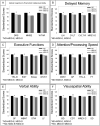Neuropsychological functioning in the acute and remitted States of late-life depression
- PMID: 25471193
- PMCID: PMC4675725
- DOI: 10.3233/JAD-148006
Neuropsychological functioning in the acute and remitted States of late-life depression
Abstract
Late-life depression (LLD, major depression occurring in an adult 60 years or older) is a common condition that frequently presents with cognitive impairment. Up to half of individuals with LLD are estimated to have cognitive impairment greater than that of age- and education-matched comparators, with impairments of episodic memory, speed of information processing, executive functioning, and visuospatial ability being most common. To inform our understanding of the state- versus trait-effects of depression on neuropsychological functioning, and to overcome limitations of previous studies, we utilized baseline data from the longitudinal Pathways study to compare differences in single time point performance on a broad-based neuropsychological battery across three diagnostic groups of older adults, each comprised of unique participants (n = 438): currently depressed (n = 120), previously depressed but currently euthymic (n = 190), and never-depressed (n = 128). Consistent with our hypotheses, we found that participants with a history of depression (currently or previously depressed) performed significantly worse than never-depressed participants on most tests of global cognition, as well as on tests of episodic memory, attention and processing speed, verbal ability, and visuospatial ability; in general, differences were most pronounced within the domain of attention and processing speed. Contrary to our hypothesis, we did not observe differences in executive performance between the two depression groups, suggesting that certain aspects of executive functioning are "trait deficits" associated with LLD. These findings are in general agreement with the existing literature, and represent an enhancement in methodological rigor over previous studies given the cross-sectional approach that avoids practice effects on test performance.
Keywords: assessment; cognitive function; depression; elderly; geriatric; neuropsychological.
Figures

References
-
- Blazer DG. Depression in late life: review and commentary. J Gerontol A Biol Sci Med Sci. 2003;58:249–265. - PubMed
-
- Butters MA, Whyte EM, Nebes RD, Begley AE, Dew MA, Mulsant BH, Zmuda MD, Bhalla R, Meltzer CC, Pollock BG, Reynolds CF, 3rd, Becker JT. The nature and determinants of neuropsychological functioning in late-life depression. Arch Gen Psychiatry. 2004;61:587–595. - PubMed
-
- Sheline YI, Barch DM, Garcia K, Gersing K, Pieper C, Welsh-Bohmer K, Steffens DC, Doraiswamy PM. Cognitive function in late life depression: relationships to depression severity, cerebrovascular risk factors and processing speed. Biol Psychiatry. 2006;60:58–65. - PubMed
-
- Nebes RD, Butters MA, Mulsant BH, Pollock BG, Zmuda MD, Houck PR, Reynolds CF., 3rd Decreased working memory and processing speed mediate cognitive impairment in geriatric depression. Psychol Med. 2000;30:679–691. - PubMed
-
- Lockwood KA, Alexopoulos GS, van Gorp WG. Executive dysfunction in geriatric depression. Am J Psychiatry. 2002;159:1119–1126. - PubMed
Publication types
MeSH terms
Grants and funding
LinkOut - more resources
Full Text Sources
Medical

